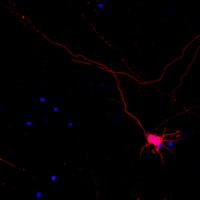A single allele of Hdac2 but not Hdac1 is sufficient for normal mouse brain development in the absence of its paralog.
Hagelkruys, A; Lagger, S; Krahmer, J; Leopoldi, A; Artaker, M; Pusch, O; Zezula, J; Weissmann, S; Xie, Y; Schöfer, C; Schlederer, M; Brosch, G; Matthias, P; Selfridge, J; Lassmann, H; Knoblich, JA; Seiser, C
Development (Cambridge, England)
141
604-16
2014
Mostrar Resumo
The histone deacetylases HDAC1 and HDAC2 are crucial regulators of chromatin structure and gene expression, thereby controlling important developmental processes. In the mouse brain, HDAC1 and HDAC2 exhibit different developmental stage- and lineage-specific expression patterns. To examine the individual contribution of these deacetylases during brain development, we deleted different combinations of Hdac1 and Hdac2 alleles in neural cells. Ablation of Hdac1 or Hdac2 by Nestin-Cre had no obvious consequences on brain development and architecture owing to compensation by the paralog. By contrast, combined deletion of Hdac1 and Hdac2 resulted in impaired chromatin structure, DNA damage, apoptosis and embryonic lethality. To dissect the individual roles of HDAC1 and HDAC2, we expressed single alleles of either Hdac1 or Hdac2 in the absence of the respective paralog in neural cells. The DNA-damage phenotype observed in double knockout brains was prevented by expression of a single allele of either Hdac1 or Hdac2. Strikingly, Hdac1(-/-)Hdac2(+/-) brains showed normal development and no obvious phenotype, whereas Hdac1(+/-)Hdac2(-/-) mice displayed impaired brain development and perinatal lethality. Hdac1(+/-)Hdac2(-/-) neural precursor cells showed reduced proliferation and premature differentiation mediated by overexpression of protein kinase C, delta, which is a direct target of HDAC2. Importantly, chemical inhibition or knockdown of protein kinase C delta was sufficient to rescue the phenotype of neural progenitor cells in vitro. Our data indicate that HDAC1 and HDAC2 have a common function in maintaining proper chromatin structures and show that HDAC2 has a unique role by controlling the fate of neural progenitors during normal brain development. | Immunohistochemistry | 24449838
 |









